The Conference Board Consumer Confidence Index increased by 12.3 points in May to 98.0 (1985=100), up from 85.7 in April.
- The Present Situation Index, based on consumers’ assessment of current business and labor market conditions, rose 4.8 points to 135.9.
- The Expectations Index, based on consumers’ short-term outlook for income, business and labor market conditions, surged 17.4 points to 72.8 but remained below the threshold of 80, which typically signals a recession ahead.
The cutoff date for preliminary results was May 19, 2025. The Board collected about half of the responses after its May 12 announcement of a pause on some tariffs on imports from China.
“Consumer confidence improved in May after five consecutive months of decline,” said Stephanie Guichard, senior economist, Global Indicators at The Conference Board. “The rebound was already visible before the May 12 U.S.-China trade deal but gained momentum afterward. The monthly improvement was largely driven by consumer expectations as all three components of the Expectations Index—business conditions, employment prospects and future income—rose from their April lows.
“Consumers were less pessimistic about business conditions and job availability over the next six months and regained optimism about future income prospects. Consumers’ assessments of the present situation also improved. However, while consumers were more positive about current business conditions than last month, their appraisal of current job availability weakened for the fifth consecutive month,” continued Guichard.
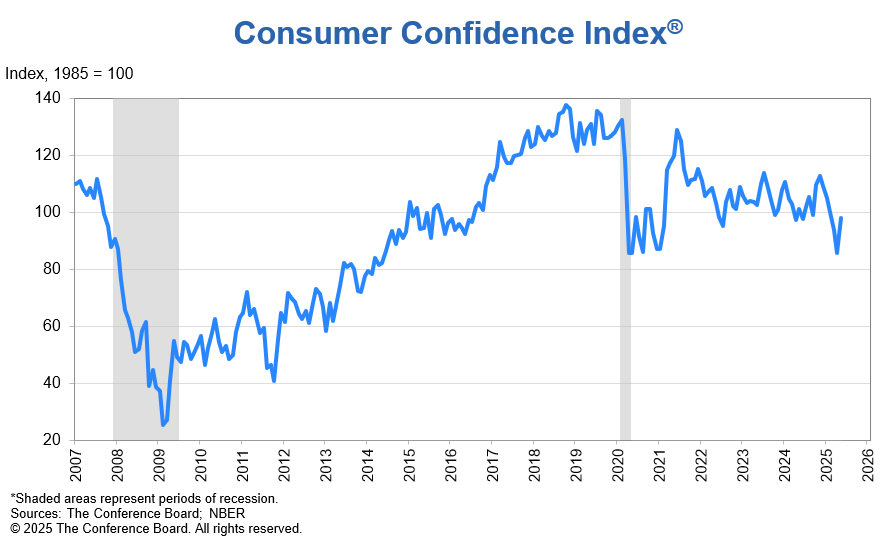
May’s rebound in confidence was said to be broad-based across all age and income groups and shared across all political affiliations, with the strongest improvements among those identifying as Republicans. However, on a six-month moving average basis, confidence in all age and income groups was still down due to previous monthly declines.
Guichard added, “With the stock market continuing to recover in May, consumers’ outlook on stock prices improved, with 44 percent expecting stock prices to increase over the next 12 months (up from 37.6 percent in April) and 37.7 percent expecting stock prices to decline (down from 47.2 percent in April).”
Guichard said the Outlook on Stock Prices query was one of the survey questions with the strongest improvement after the May 12 trade deal.
Write-in responses on which topics are affecting consumer views of the economy found that tariffs are still top-of-mind. Notably, consumers continued to express concerns about tariffs increasing prices and having negative impacts on the economy, but some consumers also expressed hopes that the announced and future trade deals would support economic activity. While inflation and high prices remained a significant concern for consumers in May, some also mentioned the potential for easing inflation and lower gas prices.
Consumers’ views of their family’s current and future financial situations improved. The share of consumers expecting a recession over the next 12 months declined (not included in calculating the Consumer Confidence Index). Consumers’ expectations for interest rates ahead changed little, while the average 12-month inflation expectations eased to 6.5 percent after spiking at 7 percent in April.
Compared to April, consumer plans for purchasing homes, cars and vacations increased, with some significant gains after May 12. Plans to buy big-ticket items, including appliances and electronics, were also increased. Likewise, consumers’ intentions to purchase more services in the months ahead, with almost all service categories showing an increase. Dining out remained the top spending intention, followed by streaming services. Plans to spend on movies, theater, live entertainment, and sporting events increased the most over the last month.
In a special question, consumers were asked if they changed their spending and financial behavior recently. More than one-third (36.7 percent) said they put money aside for future expenditures. Around a quarter of consumers (26.6 percent) dipped into their savings to pay for goods and services, and 26 percent postponed major purchases. However, notable differences existed between income groups. For example, consumers in households earning over $125,000 were more likely to report saving money, while less wealthy families were more likely to have drawn on their savings or postponed purchases. In addition, only 19 percent of respondents indicated having advanced purchases ahead of tariffs, but that share was higher for consumers in wealthier households (26 percent).
This month’s survey also asked consumers how concerned they were about being laid off, being unable to afford necessities, and being unable to afford desired goods and services. Overall, respondents were more anxious about affordability than job security, with nearly half concerned about not being able to buy the things they need or want, compared to less than a quarter worried about losing their jobs.
Present Situation
Consumers’ assessments of current business conditions improved in May.
- 21.9 percent of consumers said business conditions were “good,” up from 19.2 percent in April.
- 14.0 percent said business conditions were “bad,” down from 16.3%.
Consumers’ views of the labor market weakened in May.
- 31.8 percent of consumers said jobs were “plentiful,” up slightly from 31.2 percent in April.
- 18.6 percent of consumers said jobs were “hard to get,” up from 17.5 percent.
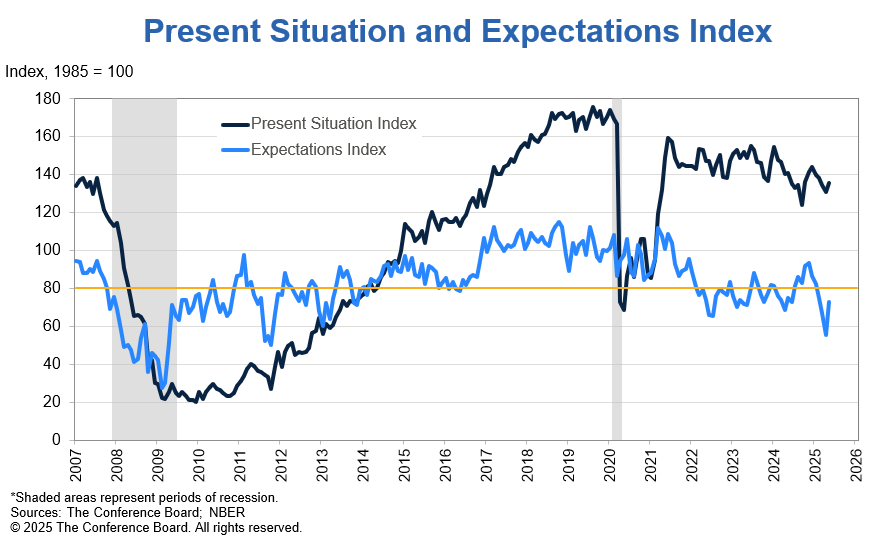
Expectations Six Months Hence
Consumers were less pessimistic about future business conditions in May.
- 19.7 percent of consumers expected business conditions to improve, up from 15.9 percent in April.
- 26.7 percent expected business conditions to worsen, down from 34.9 percent.
Consumers’ outlook for the labor market outlook was also less negative in May.
- 19.2 percent of consumers expected more jobs to be available, up from 13.9 percent in April.
- 26.6 percent anticipated fewer jobs, down from 32.4 percent.
Consumers’ outlook for income prospects turned positive in May.
- 18.0 percent of consumers expected their incomes to increase, up from 15.9 percent in April.
- 13.8 percent expected their income to decrease, up from 17.7%.
Assessment of Family Finances and Recession Risk
- Consumers’ assessments of their family’s current financial situation improved in May.
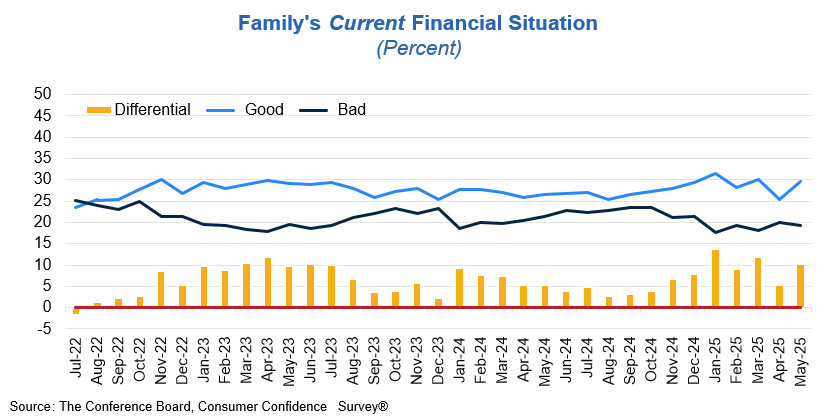
- Consumers’ assessments of their family’s expected financial situation also improved.
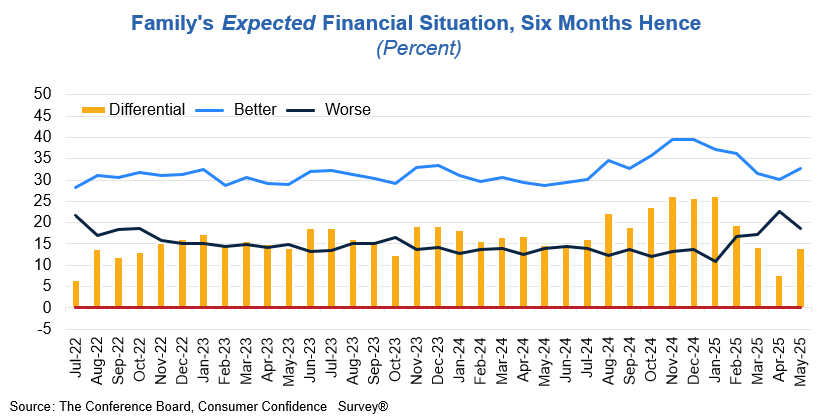
- Consumers’ perceived likelihood of a U.S. recession over the next 12 months declined in May.
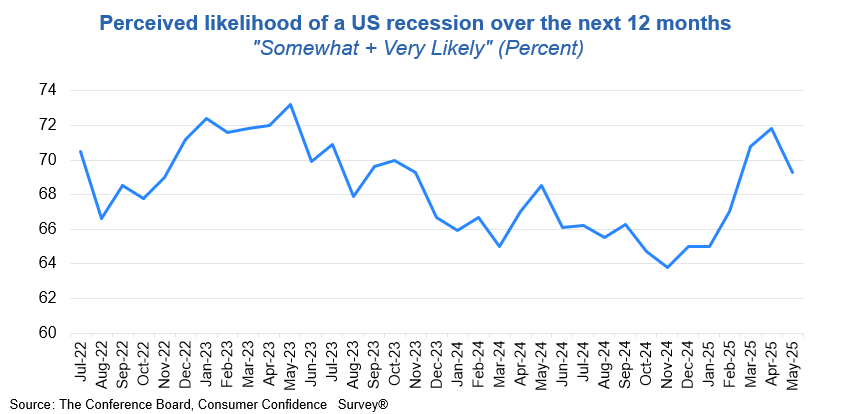
Special Questions, May 2025
Many consumers indicated saving for future expenses, digging into their savings and postponing major purchases.
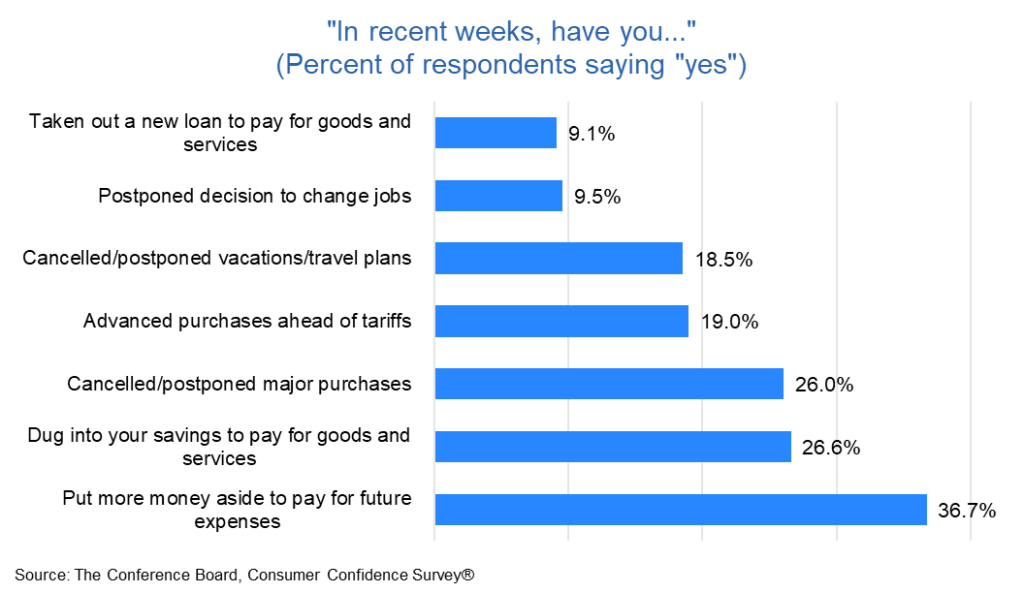
However, there are substantial differences in behavior based on household income.
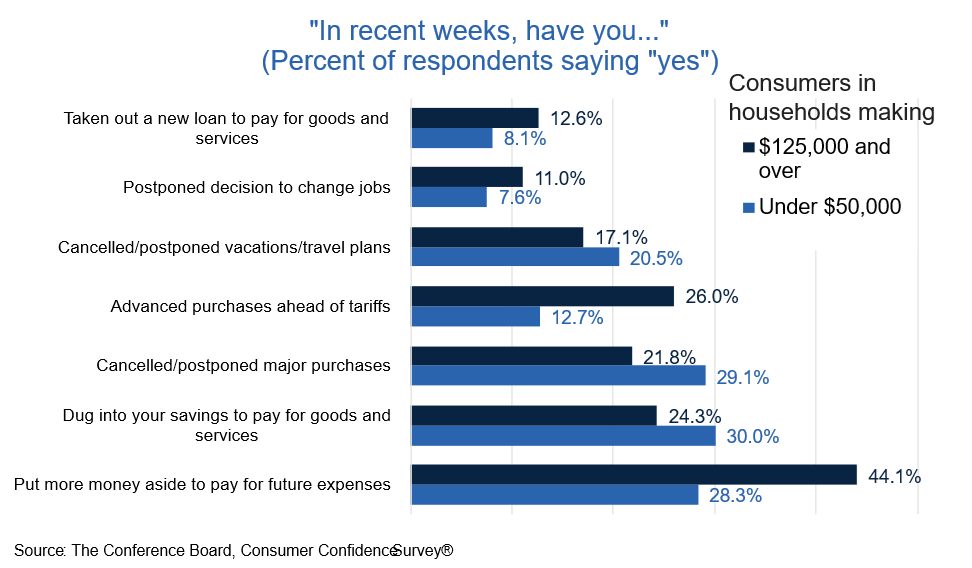
Consumers are more worried about the affordability of goods and services than losing their jobs.
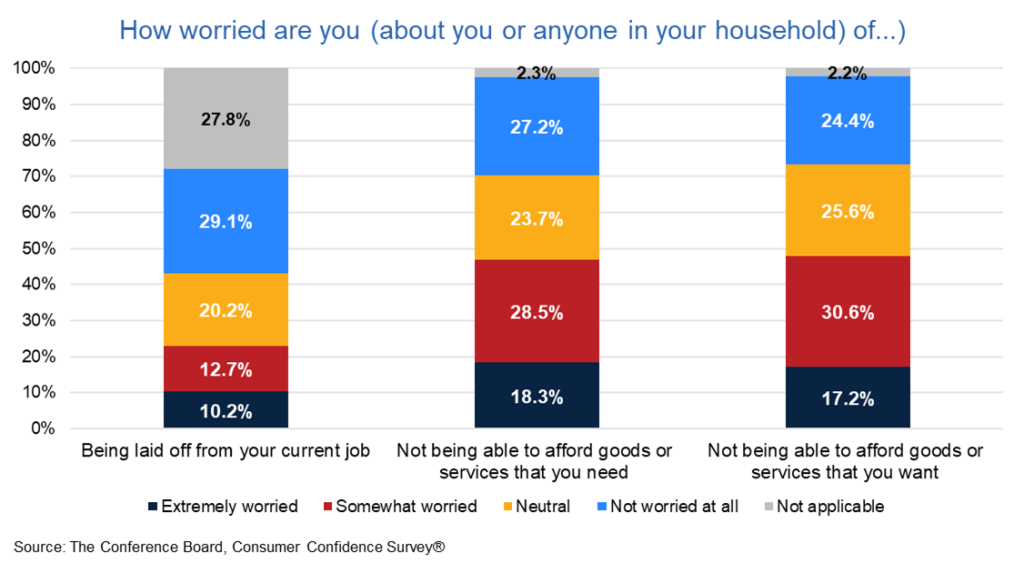
The monthly Consumer Confidence Survey, based on an online sample, is conducted for The Conference Board by Toluna, a technology company that delivers real-time consumer insights and market research through its technology, expertise and panel of over 36 million consumers.
The cutoff date for the preliminary results was May 19.
Data, charts and graphs courtesy The Conference Board
















